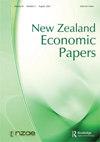What is the role of biodiversity in mediating the effects of climate change on New Zealand’s future agroecosystems?
IF 0.7
Q3 ECONOMICS
引用次数: 0
Abstract
ABSTRACT Climate change will have far-reaching negative impacts on all aspects of Earth’s state and functions, including ongoing biodiversity decline and threats to agricultural production. These effects will be dependent on geographic location; for example, parts of New Zealand are predicted to have increased flooding, drought and wildfires, depending on the local environmental context. Effects of climate change on agricultural production will be both direct, such as crop losses due to flooding, and indirect, such as increased invasive pest insect and weed pressure on horticultural production or decline in water capture capacity in pastoral South Island High Country tussock grasslands due to increased fire frequency combined with grazing. It is crucial to understand the complex, interactive effects of climate change on agroecosystems, mediated by biodiversity, if human interventions, such as land management, are to be developed and effectively applied to mitigate negative consequences. Even better is if those interventions can be used to address the biodiversity crisis. Nature-based Solutions is a framework that offers such solutions; however, improved scientific understanding of these interacting processes within agroecosystems is required at multiple temporal and spatial scales to justify sector investment for changes in agricultural land management practices that enhance production and native biodiversity.生物多样性在调节气候变化对新西兰未来农业生态系统的影响方面发挥着什么作用?
摘要气候变化将对地球状态和功能的各个方面产生深远的负面影响,包括持续的生物多样性下降和对农业生产的威胁。这些影响将取决于地理位置;例如,根据当地的环境情况,预计新西兰部分地区的洪水、干旱和野火会增加。气候变化对农业生产的影响既有直接影响,如洪水造成的作物损失,也有间接影响,如入侵性害虫和杂草对园艺生产的压力增加,或由于火灾频率增加和放牧导致南岛高海拔草原的水捕获能力下降。如果要制定并有效应用土地管理等人类干预措施来减轻负面后果,就必须了解气候变化对农业生态系统的复杂互动影响,这种影响是由生物多样性介导的。如果这些干预措施能够用于解决生物多样性危机,那就更好了。基于自然的解决方案是一个提供此类解决方案的框架;然而,需要在多个时间和空间尺度上提高对农业生态系统内这些相互作用过程的科学理解,以证明部门投资改变农业土地管理做法的合理性,从而提高生产和本地生物多样性。
本文章由计算机程序翻译,如有差异,请以英文原文为准。
求助全文
约1分钟内获得全文
求助全文
来源期刊

New Zealand Economic Papers
Economics, Econometrics and Finance-Economics, Econometrics and Finance (all)
CiteScore
1.20
自引率
0.00%
发文量
17
 求助内容:
求助内容: 应助结果提醒方式:
应助结果提醒方式:


